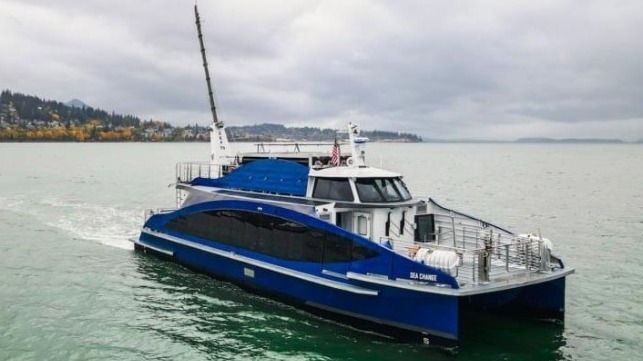Hornblower Receives $8M Grant to Develop Hydrogen Fueling Station

Efforts are underway for the design and construction of what could become the first floating green hydrogen fueling station for the maritime industry. Hornblower Group revealed today that it has received an $8 million grant from the U.S. Department of Energy to support a three-year project it launched in 2021 to produce green hydrogen through the use of hydroelectric power. The grant is part of the DOE’s initiative to develop affordable hydrogen production, storage, distribution, and utilization.
The goal of the project is to demonstrate the use of zero-carbon hydroelectric energy in the electrolysis of water, producing green hydrogen for ferry and maritime vessels, and growing uses of hydrogen, on land for example in hydrogen fuel cell vehicles. The floating and movable system is also compatible with other zero-carbon sources of electricity, for example offshore wind. Hornblower expects the fueling will be available beginning in 2024.
“Hydrogen technology will very likely play an important role in zero-emission energy efforts for years to come, and while this new project is uncharted territory for the entire industry, Hornblower is dedicated to sustainable practices both on land and on the water,” said Cameron Clark, chief strategy and business development officer at Hornblower Group. “We appreciate the leadership and support from the DOE in demonstrating and supporting promising green energy projects.”
With this build, Hornblower says it will demonstrate the feasibility and viability of hydrogen production, storage, and fueling on the water, establishing robust science-based protocols, procedures, and operating parameters. Training materials will also be developed for the safe and routine generation and storage of electrolyzed hydrogen and handling of water-to-water and water-to-land hydrogen and fuel-cell power transfer.
The project aims to demonstrate a first-of-its-kind hydrogen production, storage, and fueling capabilities of up to 530 kg of hydrogen per day. An integrated system of green hydrogen production via water electrolysis and hydrogen power generation via fuel cell—both mounted on the floating station—will bring commercial hydrogen technology to the maritime industry.
They also aim to support their efforts at the development and introduction of some of the world’s first commercial hydrogen-powered vessels. Hornblower Group is in partnership with SWITCH Maritime to operate the Sea Change, the first-ever zero-emission commercial ferry powered entirely by hydrogen fuel cell technology. Launched in the summer of 2021, the Sea Change is a 70-foot, 75-passenger commuter ferry powered by 360 kW of fuel cells and 100 kWh of lithium-ion battery integrated with 2x 300 kW electric traction propulsion motors.
The Sea Change is currently undergoing testing and proof on concept trials with the U.S. Coast Guard in Puget Sound near where it was built at All American Marine shipyard in Bellingham, Washington. Once it completes its Coast Guard certification, the ferry will be repositioned to San Francisco Bay where it will operate a test program with the California Air Resources Board and begin carrying its first passengers.

that matters most
Get the latest maritime news delivered to your inbox daily.
Hornblower is also working on a project funded by the Department of Transportation’s Maritime Administration for a fuel cell-battery hybrid ferry. Known as Discover Zero, the project is planning a 149-foot-long ferry capable of operating at speeds of up to 12 knots and carrying 600 passengers.
Participants in the project to develop the fueling station include Sandia National Laboratories and the Port of San Francisco along with private sector collaborating vendors Air Liquide, BayoTech Group, Nel Hydrogen, and Glosten.
